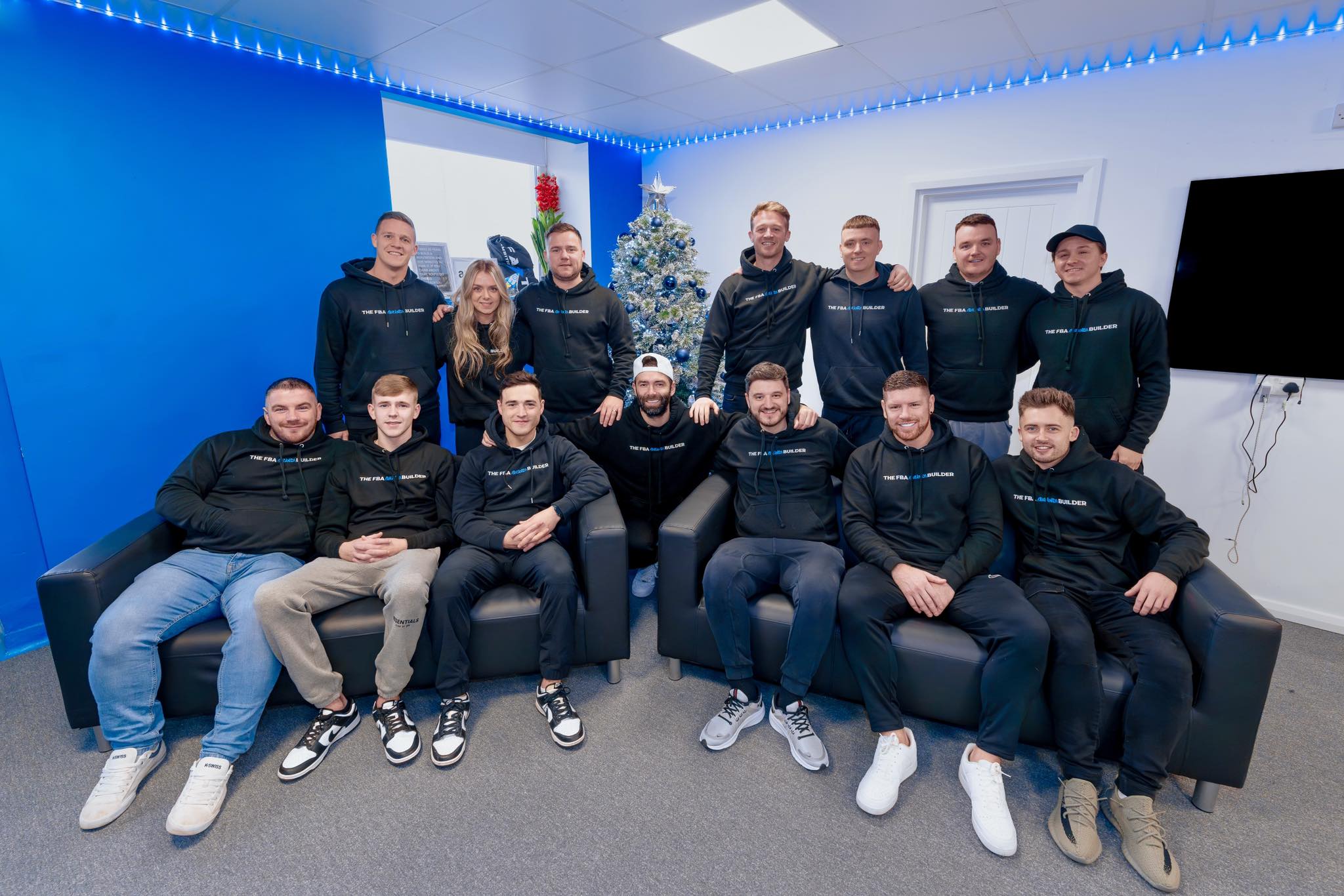When you pay £6,500 to join a business mentorship program, you’d expect transparency and experienced guidance. But Darren Campbell’s FBA Brand Builder program doesn’t offer that upfront. Instead, clients only meet their mentors after they've paid, through a “Meet Your Team” video that raises more questions than it answers.
The program markets these mentors as experts in Amazon FBA, but many of them are still finding their own footing—or recovering from failed ventures. Worse, their guidance often mirrors the same questionable practices Darren himself is known for.
The Team: Who’s Actually Giving the Advice?
Ryan Stewart: “Still in Second Gear”
Ryan Stewart, the Client Fulfillment Manager, admits he’s still navigating his own brand, Fast Ambition.
“We’re still in second gear, but it’s been a journey.”
For someone responsible for helping clients achieve financial independence, being stuck in “second gear” doesn’t inspire confidence. And Fast Ambition itself? As we revealed in Is Fast Ambition Really a ‘Million-Dollar’ Amazon Brand?, the data doesn’t back Darren’s claims.
The brand’s low review count, minimal website traffic, and tiny social media following paint a picture of a struggling startup—not a thriving success story. If this is the expertise clients are banking on, it’s no wonder many feel misled.
Jason McKay: Mentorship or Just Another Learner?
Jason McKay serves as a Business Development Manager within FBA Brand Builder, positioned as a key figure offering clients guidance and support. But while clients pay £6,500 upfront and £150 a month for expert mentorship, Jason’s own knowledge seems worryingly incomplete.
Evidence from seller forums reveals Jason asking beginner-level questions that highlight his inexperience. For instance, he posted about struggling with bundling logistics:
“When bundling items, am I better to put it all into one product box or keep them separate?”
This is a fundamental question for anyone running an Amazon FBA business—let alone someone tasked with mentoring others. Similarly, Jason admitted difficulty securing brand approval, writing:
“I’ve tried about five times but no joy. Is there anything I can do?”
These posts paint a clear picture of someone still learning the ropes. Yet instead of addressing the knowledge gaps, Darren Campbell and his team market Jason as a mentor, perpetuating the cycle of inexperienced leadership.
Clients aren’t just paying for mentorship—they’re bankrolling someone else’s learning curve. Jason’s position raises a pressing question: how can clients trust the program when even its mentors are still figuring out the basics?

Ryan and Daz Tweed: The $1 Million Myth
The Tweed brothers, Ryan and Daz, are introduced as operations and product research specialists. Together, they co-founded Fast Ambition and claim to have generated £500,000 in revenue over 18 months. But revenue is just part of the story—it doesn’t account for profitability or sustainability.
Darren frequently hypes Fast Ambition as being on track for $1 million in sales, but our investigation showed otherwise. As with Ryan, the Tweeds’ experience seems more about inflating revenue figures than delivering genuine results.
And Daz’s other ventures don’t fare much better. His company, Big AL Enterprises Ltd, dissolved earlier this year after less than a year of operation, despite Darren promoting it as a “huge success” in January.
“Generating over $20,000 (20K) in only their first 40 days launched on Amazon 🇺🇸.” – Darren Campbell
Instead of addressing these failures, Daz transitioned into a mentorship role, continuing the cycle of overselling and underdelivering.
Nicole: Modest Results, Big Responsibilities
Nicole, a former civil servant, launched Mighty Equipped after joining Darren’s program. She reports £50,000 in revenue—a decent figure, but one that likely spans years and doesn’t guarantee profitability.
As a Stage 1 mentor, Nicole is responsible for guiding clients through their first steps, setting the tone for their entire journey. With such modest experience, it’s unclear how well-equipped she is to handle the challenges clients face in this high-stakes industry.
Jake Parker and Kayley Hutchison: Inexperienced and Risky
Jake and Kayley are two of the most controversial figures in the program. After their Amazon brand, failed to gain traction, they shifted into mentorship roles.
As we revealed in Two Inexperienced Mentors, Countless Missteps: Inside the FBA Brand Builder Coaching Fiasco, their advice has been both reckless and harmful:
- Promoting risky credit cards: They push AMEX Gold Cards using referral links, earning personal bonuses while driving clients deeper into debt.
- Encouraging fraud-like practices: Clients were advised to falsify supplier quotes and inflate revenue figures on credit applications.
- Misinformation on tax forms: Jake and Kayley told participants to select “Private Foundation” on Amazon’s W-8BEN-E tax form, a move that could trigger audits or account freezes.
It’s one thing to fail in business—it’s another to mentor others while repeating the same mistakes.

Jordan McClean: Promises of Expertise, Gaps in Delivery
Jordan’s mentorship sessions are symptomatic of broader issues within the FBA Brand Builder program: the team’s lack of deep expertise and the disconnect between the program’s promises and its actual delivery. For clients paying thousands for expert guidance, the vague and generic advice they receive fails to justify the cost.
If mentors like Jordan are positioned as leaders within the program, what does that say about the quality of mentorship across the board? For clients looking to grow their businesses, FBA Brand Builder’s guidance seems more like guesswork than the seasoned expertise they were promised.
A Cycle of Inexperience and Poor Advice
Darren Campbell’s program markets itself as offering expert mentorship, but the team’s lack of experience suggests otherwise. Darren himself admits that his team “started from nothing,” a fact he spins as inspiring.
But for clients, this inexperience often leads to costly mistakes. As Kirsty, a former client, shared:
“My brand manager wasn’t even active on my account, and there were 13 live ad campaigns draining my budget with no results.”
When mentors rely on trial and error, it’s clients who pay the price.

Manipulating the System Instead of Mastering It
Darren and his team have normalized unethical practices, from fake Amazon reviews to misleading credit applications. In one instance, Darren posted step-by-step instructions in the FBA Brand Builder community, encouraging participants to buy a product, leave a glowing review, and get reimbursed:
“You will get a £100+ product for free by simply leaving a lovely review on Amazon.”
This blatant review manipulation violates Amazon’s policies and jeopardizes clients’ accounts. Similarly, Darren’s advice to inflate income and revenue on credit applications mirrors tactics repeated by his team.
The Cost of Following Bad Advice
Whether it’s pushing debt, encouraging fake reviews, or bungling tax guidance, the advice from Darren’s team often leaves clients worse off:
- Mounting debt: Many clients max out credit cards or take loans to cover escalating program costs.
- Damaged relationships: Financial stress has strained marriages and caused family conflicts.
- Lost confidence: Participants who dreamed of financial freedom are left feeling disillusioned and trapped.
The Illusion of Expertise, Leading To Financial Losses
Darren Campbell’s FBA Brand Builder promises transformation and success, but the reality is far from inspiring. With mentors still learning the ropes or recovering from failed ventures, the program’s foundation feels shaky at best.
If you’re considering joining, ask yourself:
- Are the mentors truly qualified?
- Is the advice ethical and actionable?
- Are you being sold a dream—or a risky gamble?
For many clients, the answers are clear. And until Darren and his team take accountability for their failures, the program will remain a cautionary tale in the world of e-commerce mentorship.

